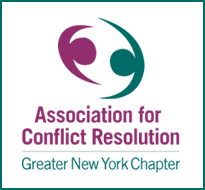|
2018 Conference Agenda (subject to change) View all program materials here
Monday, June 4 Kick-Off Program and Cocktail Reception Kick-Off Program and Cocktail Reception to take place at JAMS, 620 8th Avenue, 34th Floor, New York, NY Conference registrants receive complimentary admission to the Kick Off Program & Cocktail Reception. You can also register for this event individually. 6:00PM – 7:30PM: Dr. Heather Ann Thompson – Author, Attica: Blood in the Water (winner of the Pulitzer Prize in History, 2017) Dr. Thompson will also be interviewed by Michael Young of JAMS. 7:30PM – 9:30PM: Cocktail Reception with heavy Hors D’Oeuvres Kick-Off Program and Cocktail Reception to take place at JAMS, 620 8th Avenue, 34th Floor, New York, NY Conference registrants receive complimentary admission to the Kick Off Program & Cocktail Reception. You can also register for this event individually. Tuesday, June 5 Full-Day Conference All conference sessions to take place at New York Law School, 185 West Broadway, New York, NY 7:30AM – 8:30AM: Registration and Breakfast 8:30AM – 9:00AM: Welcome Remarks 9:00AM – 10:00AM: Session 1 1A: ADR in a Changing Climate: How to Build Resilience through Facilitation and Collaboration NY CLE Credit Pending: 1.0 hours See here for materials Bennett Brooks, Senior Mediator, Consensus Building Institute Catherine Morris, Senior Mediator, Consensus Building Institute Joseph A. Siegel, Elisabeth Haub School of Law at Pace University Description: What does ADR look like in the world of climate change adaptation? And what are the important contributions that conflict resolution professionals can make to support resilience efforts? This session will offer examples of cutting-edge facilitated processes within communities and other multi-stakeholder groups designed to address current and future impacts of climate change. It will examine what is unique about collaborating on climate change issues, the challenges faced by stakeholders doing resilience planning, and the skills and opportunities that neutrals can bring to the planning process. After a brief introduction to climate change impacts in our region and the field of environmental facilitation, the presenters will discuss a range of strategies and tools that are particularly relevant to facilitating climate change resilience and then offer specific examples of facilitated multi-stakeholder planning processes. We will then engage in a group discussion about how the skills and strategies used by attendees from other conflict resolution fields might inform and be informed by the examples shared during the presentation. 1B: Ethno-Religious Conflict: Models to Conflict Resolution Doug Hostetter, Director of the Mennonite Central Committee United Nations Office Priscilla Prutzman, Co-Founder & Executive Director, Creative Response to Conflict Dr. David Ragland, Fellowship of Reconciliation, Senior Bayard Rustin Fellow Moderator: Dustin Hausner, Founder, Hausner Consulting Description: What is Ethno-Religious Conflict? For many it refers to a conflict in which the party’s religious and ethnic identification plays a role in the conflict. Their religious or ethnic identity shapes there social and cultural life and effects there moral and philosophical ideology. The panel consists of diverse perspectives on this subject and different approaches to the challenge of finding conflict resolution. Each panelists will speak about there own experiences and what they see as the main factors when approaching this type of conflict. Please join us for this unique educational opportunity. 1C: Career Building for ADR Professionals: Leveraging Conferences, Networking Excellence and LinkedIn Essentials NY CLE Credit Pending: 1.0 hours See here for materials Todd Drucker, Regional Practice Development Director, JAMS Stefanie Marrone, Director of Business Development and Marketing, Tarter, Krinsky & Drogin LLP Description: Attending conferences is an essential component of career development for any professional. Yet, most individuals do little to take advantage of the tremendous networking opportunities conferences provide. It is takes hard work and forethought to maximize the value of attending a conference – but if an attendee is properly prepared and focused, the potential rewards are phenomenal. In this important session, you’ll learn key techniques to help maximize your effectiveness at a conference – including arranging your own conference within a conference, strategies for connecting with high-profile individuals, how to secure a speaking role, the importance of attendee lists, follow-up strategies…and much more. A review of established conflict resolution conferences, both locally and nationally, will also be covered. This session will also provide a review of the importance of LinkedIn for conflict resolution professional, including the value of building a profile that resonates with peers and potential employers. W1: Using Restorative Practices in City Government (2-hour workshop) NY CLE Credit Pending: 2.0 hours See here for materials
Description: The Center for Creative Conflict Resolution opened its doors as a conflict resource center for city employees in Summer 2016. For the past year and a half, Center staff has been introducing Restorative Practices into the workplace, a challenging and unique endeavor in a rights-based and bureaucratic workplace. In this workshop, the Center invites attendees to participate in a Learning Circle facilitated by two circle keepers from the Center. We hope to: 1. Share the challenges and lessons of the Center’s Restorative Practices program 2. Tap into our personal conflict experiences to help shape our thinking and responses as ADR and Restorative Practice practitioners 3. Create an opportunity to exchange ideas and collectively generate best practices on Restorative Practices and workplace conflict 10:10AM – 11:00AM: Session 2 2A: "The Team" in Family and Divorce Mediation NY CLE Credit Pending: 1.0 hours See here for materials Bruce Berman, Ph.D, Psychologist, Child Consultant/Specialist, Divorce Coach, Parenting Coordinator, Family/Couple/Sex Therapist Catherine Hannibal, Mediator and Collaborative Attorney, Mediation Works, Inc. Monica Kaiser, Collaborative Family Lawyer and Divorce Mediator Jessica Rothberg, Mediator and Collaborative Attorney, Mediation Works, Inc. Mark Josephson, Esq., Founder and Senior Partner, Murray and Josephson, CPAs, LLC. Description: Family and divorce mediators find that their clients are often well-served with a team-oriented ethos involving parallel professionals (some of them also mediation trained) such as, consulting attorneys, financial specialists and mental health professionals. When one or more of these professionals is brought into the process as a "team member", it can have a marked positive impact on the process, from expediting or enhancing decision-making to supporting clients' work beyond the process so they can continue working together for the long term (such as when clients need to maintain a constructive co-parenting relationship for their children). In this discussion, each panelist will talk about their unique role in a divorce mediation and their individual experience contributing to the "team" through a successful conclusion to the divorce mediation process. 2B: Opening in Awareness: Exploring How Mindfulness and Meditation Can Enhance the Mediation Experience Katharina Mauer, Mediator, Attune Mediation and Community Mediation Services Description: By placing it within the wider wisdom context of Buddhist understandings, this interactive presentation explores how mindfulness and meditation techniques can skillfully facilitate the mediation process so that all those present at the table see conflict differently and more constructively. More specifically, Buddhism holds that people cannot stand apart from the flow of circumstances nor control them; yet, trying to do so, they inevitably suffer deep dissatisfaction. This suffering may be eased or eliminated through mindfulness and meditation. When the view of the self as standing apart from and against others loses its hold, real transformations in relationships are possible. Awareness that is less self-fixated better understands the interconnections that underlie our shared humanity and so sees conflict in a wider perspective. Through guided explorations attendees will practically experience: 1) how the mediator may manifest a meditative mind to set the stage for mediation; 2) how the meditative mind may aid not only the mediator but all those at the table to facilitate awareness; and 3) what the mediator may do after the mediation both to learn from what has happened and to continue to manifest a meditative mind. 2C: What Artists, Entertainers and Celebrities Want from ADR David Leichtman, Founding Partner, Leichtman Law PLLC Eric Goldman, Esq., Director, ACR-GNY Peter H. Woodin, Esq., Mediator and Arbitrator, JAMS Moderator: Amy Lehman, Director of Legal Services, Volunteer Lawyers of the Arts
1D: Using Restorative Practices in City Government (2-hour workshop) See info in Session 1 11:15AM – 12:15PM: Session 3 3A: The Unheralded Importance of Active Listening in Commercial and Non-Commercial Mediations NY CLE Credit Pending: 1.0 hours See here for materials Simeon Baum, President, Resolve Mediation Services, Inc. Chris Kwok, Esq., Mediator and Arbitrator, JAMS Brooke J. Willig, Litigation Associate, Debevoise Moderator: Danielle Shalov, Adjunct Professor, New York Law School Description: The successful resolution of any mediation, commercial or non-commercial, strongly depends on active listening and speaking to understand the clients/parties in an effort toward resolving conflict. In this skills-building panel discussion, attendees will learn HOW to listen actively - what techniques the mediators or attorneys have found useful from preparation, to the types of questions asked, how to withhold judgement, how to avoid speaking over/drawing conclusions, to reading and reflecting nonverbal cues. 3B: When Conflict Hits Home: How Conflict Resolution Professionals Handle Conflict in Their Own Personal Lives Tara Fishler, Conflict Resolution Specialist, Customized Training Solutions Description: What happens when YOU are in a conflict? As we interact daily with family, neighbors, friends, colleagues, etc., conflict can be unavoidable. As conflict resolution practitioners, we are not immune to experiencing our own conflicts. Many of us are drawn to the field because we are either conflict-avoidant or have faced many conflicts ourselves. What happens when we try to use our skills in ourown circles? This session will explore what works and doesn't work when we have a stake in the outcome of conflicts around us. Learn tools to use, the next time someone presses YOUR buttons! 3C: The Two-Step Mediation Process: Assuring Understanding Among the Parties + Developing and Negotiating Agreements and Options Alan Gross, Founding Member, Mediators Beyond Borders International Description: This interactive session will propose a method by which when parties come to the mediation table they are first encouraged to understand as much as possible about the development of the conflict that brought them there, their own interests and which goals support those interests, and more importantly the other party's goals and interests. Once such understanding is obtained and clearly verified emphasized via facilitation, reflection and even written notes, only then will the mediator facilitate an open and self-determined discussion about which choices/options are likely to be mutually acceptable and lead to a resolution. The understanding part of the session depends heavily on concepts from the "understanding based model of mediation" developed by Friedman, Himmelstein and Miller. The proposed model, however, varies in certain respects especially emphasizing precise and repeated reflections (a form of "looping" as labeled by Himmelstein et. al) not only offered by the mediator but also by each party to demonstrate understanding. Additionally the proposed model permits caucusing and separate meetings which are prohibited by the Himmelstein model. Caucusing is proposed as a useful "break" from intense engagement and an opportunity to clarify, re-consider goals and proposals but it is only to be used when chosen ("self-determined") by the parties who are given this choice. There are two general principles that this program will highlight: 1) agreement is NOT the gold standard and it is sometimes best when parties recognize they cannot agree and that it is in their best interest to change jobs, move , get divorced etc. 2) transparent mediaiton technique that allows parties to understand mediator strategies/techniques such as reflection which the parties can learn and use later after the session. For more background information: http://www.mediate.com//articles/grossa1.cfm (on agreement not being the only success standard) http://www.mediate.com//articles/GrossA3.cfm (on transparent mediation) 12:30PM – 2:30PM: ACR-GNY Award Luncheon Keynote Address: Senator George Mitchell, Interviewer Brian Lehrer ADR Achievement Award: Charlotte Carter, Past-Executive Director, New York State Dispute Resolution Association (NYSDRA) ADR Achievement Award: Marvin Johnson, Founder, Center for Alternative Dispute Resolution 2:45PM – 4:00PM: Session 4 4A: 60 Years Since the New York Convention: How Has Arbitration Changed? NY CLE Credit Pending: 1.5 hours See here for materials Bob Davidson, Executive Director of Arbitration Practice, JAMS Lea Haber Kuck, Partner, Skadden, Arps, Slate, Meagher & Flom LLP & Affiliates Richard Mattiaccio, Charter Arbitrator, FCIArb, CCA Fellow Rekha Rangachari, Executive Director, New York International Arbitration Center Paul Bennett Marrow, Arbitrator and Member Commercial Panel, Complex Case Panel and Consumer Panel, American Arbitration Association Jeff Zaino, Vice President, Commercial Division, American Arbitration Association Description: On 10 June 1958, a diplomatic conference convened by the United Nations in New York concluded the Convention on the Recognition and Enforcement of Foreign Arbitral Awards. The so called New York Convention is one of the most successful treaties in the area of commercial law, currently adhered to by 157 States, including the major trading nations. It has served as a model for many subsequent international legislative texts on arbitration.
The program will discuss the changes over the past sixty years since the New York Convention’s ratification in the U.S. Topics include the changing role of arbitral rules, arbitrators, discovery, awards and enforcement proceedings, and the landscape of arbitral institutions. Participants will be asked to consider whether public perception about arbitration has changed and whether the role of the courts has evolved in response to the increased use of arbitration over litigation. 4B: Restorative Justice in the Workplace and the #MeToo Movement James Kornbluh, Mediator and Coach, Kornbluh Consulting Description: In this day of racial divides, class oppression and sexual harassment, our communities function with an ever-increasing degree of 'fight or flight' responses resulting in more conflict, defensiveness and the sense that one must protect their limited resources. James and Elizabeth will lead a discussion with the group on how peacekeeping circles can be used to turn off the fight or flight response and add the crucial element that communities are missing: relatedness. W2: Collaborative Co-Mediation: How to Co-Mediate Without Needing a Mediator (2.5 hour workshop) Elena Sapora, Mediation and Conflict Resolution Specialist Description: Two heads are better than one, or so they say. We all know the pitch for co-mediation, but how often does our experience fall short of the ideal? What does it take to really work seamlessly with a co-mediator? How do we work collaboratively with someone whose skills and approach are different from our own? How do we find a groove with someone we’ve never worked with before? During this interactive workshop we will explore the elements of an effective co-mediation relationship, as well as issues that undermine the process. We will also share and practice tools to build trust, improve communication, and overall enhance the co-mediation experience. 4:15PM – 5:30PM: Session 5 5A: The Art and Science of Mediation: Latest Works NY CLE Credit Pending: 1.5 hours See here for materials Dan Weitz, Director, Division of Professional and Court Services, NYS Unified Court System Description: What is the latest work surrounding the intersection between neuroscience and mediation? This presentation will provide a review of the differences between “gut feelings” and reason, followed by various social science studies that provide potential insights into common barriers to communication and the mediation techniques used to overcome them. 5B: Practicing What We Preach: Tips to Facilitate Diversity, Inclusion and Equity in ADR NY CLE Credit Pending: 1.5 hours See here for materials Jonathan Latimer, Business and Family Law Attorney, J.C. Latimer Law, PLLC Maurice Robinson, EEO Officer & Assistant Director, New York City Housing Authority Joy Rosenthal, Divorce Mediator, Family Law Collaborative Attorney, Rosenthal Law & Mediation M. Salman Ravala, Partner, Criscione Ravala, LLP’s Niki Borofsky, Vice President, Membership Services CPR: International Institute for Conflict Prevention and Resolution Description: An increasing number of corporations require, or at least encourage, their professional firms to have diverse teams. Also an increasing number of organizations globally have diverse boards of directors. However, when selecting an arbitrator or mediator for their disputes, often there is no consideration of diverse neutrals. While many organizations and law firms commit to diversity, both internally and externally, few have brought that commitment to their selection of arbitrators and mediators.
This panel will discuss ways in which both gatekeepers and gatecrashers alike can work collaboratively to foster greater diversity on panels and healthier selection of diverse neutrals. The panelists will discuss a wide range of issues, including: · Successful strategies used by organizations to increase diversity and diverse neutral selection; · How employing diverse neutrals may benefit the parties to a dispute; · Strategies used by diverse neutrals to carve out successful niches for themselves; and, · Explore how non-diverse neutrals can be effective allies in fostering greater diversity in their organizations and in the selection process. 4C: Collaborative Co-Mediation: How to Co-Mediate Without Needing a Mediator (2.5 hour workshop) See info in Session 4 5:30PM – 7:00PM: Cocktail Hour Reception Speaker: Stephanie Gendell, Associate Executive Director, Policy and Advocacy, Citizens' Committee for Children Register here |



